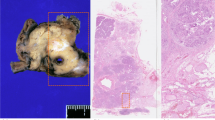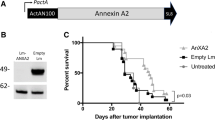Abstract
Purpose: As prognosis of advanced pancreatic cancer remains gloomy, novel therapeutic modalities have to be developed. Immunotherapy, which targets tumor-associated antigens of tumor cells or tumor stroma, is currently under investigation. As survivin is expressed by neoplastic and tumor endothelial cells, but rarely by normal cells, this antigen appears as an intriguing target molecule. Methods: A 72-year old patient, suffering from pancreatic cancer refractory to gemcitabine therapy, received the survivin-based peptide vaccinations consisting of 100 μg of a modified HLA-A2 restricted survivin96–104 epitope in Montanide®. Each visit the patient was assessed for adverse events, quality of life and immunological response. Immunemonitoring was performed by IFN-γ-ELISPOT analysis of peripheral blood lymphocytes. Clinical outcome was evaluated by repetitive computed tomography. Results: Under vaccination with survivin peptides the patient initially underwent partial remission of liver metastasis which proceeded after 6 months into a complete remission with a duration of 8 months. Immunological monitoring revealed strong vaccine-induced immune-reactivity against survivin. Unfortunately, after the patient was weaned from vaccination in state of no evidence of disease, he developed recurrent disease. Conclusion: T-cell responses against survivin-expressing cells of the tumor itself and tumor endothelium should impact tumor growth and metastasis. The presented patient with pancreatic cancer is the first example of a successful application of a survivin-based vaccination in the clinical setting. An ongoing phase I/II trial with HLA-A1, -A2 and -B35 restricted survivin peptides for patients with advanced cancer will provide further information towards this notion.


Similar content being viewed by others
References
Altieri DC (2003) Validating survivin as a cancer therapeutic target. Nat Rev Cancer 3:46–54
Andersen MH, Becker JC, Straten PT (2005) Regulators of apoptosis: suitable targets for immune therapy of cancer. Nat Rev Drug Discov 4:399–409
Andersen MH, Pedersen LO, Capeller B, Brocker EB, Becker JC, Straten PT (2001) Spontaneous cytotoxic T-cell responses against survivin-derived MHC class I-restricted T-cell epitopes in situ as well as ex vivo in cancer patients. Cancer Res 61:5964–5968
Berger TG, Haendle I, Schrama D, Luftl M, Bauer N, Pedersen LO, Schuler-Thurner B, Hohenberger W, Straten PT, Schuler G, Becker JC (2004) Circulation and homing of melanoma-reactive T cells to both cutaneous and visceral metastases after vaccination with monocyte-derived dendritic cells. Int J Cancer 20(111):229–237
Folkman J (1971) Tumor angiogenesis: therapeutic implications. N Engl J Med 285:1182–1186
Hirokawa N (1994) Microtubule organization and dynamics dependent on microtubule-associated proteins. Curr OpinCell Biol 6:74–81
Hofmeister V, Vetter C, Schrama D, Brocker EB, Becker JC (2005) Tumor stroma-associated antigens for anti-cancer immunotherapy. Cancer Immunol Immunother pp 1–14
Islam A, Kageyama H, Takada N, Kawamoto T, Takayasu H, Isogai E, Ohira M, Hashizume K, Kobayashi H, Kaneko Y, Nakagawara A (2000) High expression of Survivin, mapped to 17q25, is significantly associated with poor prognostic factors and promotes cell survival in human neuroblastoma. Oncogene 19:617–623
Jemal A, Murray T, Ward E, Samuels A, Tiwari RC, Ghafoor A, Feuer EJ, Thun MJ (2005) Cancer statistics 2005. CA Cancer J Clin 55:10–30
Kerbel R, Folkman J (2002) Clinical translation of angiogenesis inhibitors. Nat Rev Cancer 2:727–739
Lu B, Mu Y, Cao C, Zeng F, Schneider S, Tan J, Price J, Chen J, Freeman M, Hallahan DE (2004) Survivin as a therapeutic target for radiation sensitization in lung cancer. Cancer Res 64:2840–2845
Otto K, Andersen MH, Eggert A, Keikavoussi P, Pedersen LO, Rath JC, Bock M, Brocker EB, Straten PT, Kampgen E, Becker JC (2005) Lack of toxicity of therapy-induced T cell responses against the universal tumour antigen survivin. Vaccine 23:884–889
Pawelec G (2004) Tumour escape from the immune response. Cancer Immunol Immunother 53:843
Perez-Diez A, Spiess PJ, Restifo NP, Matzinger P, Marincola FM (2002) Intensity of the vaccine-elicited immune response determines tumor clearance. J Immunol 168:338–347
Rosenberg SA (2004) Shedding light on immunotherapy for cancer. N Engl J Med 350:1461–1463
Satoh K, Kaneko K, Hirota M, Masamune A, Satoh A, Shimosegawa T (2001) Expression of survivin is correlated with cancer cell apoptosis and is involved in the development of human pancreatic duct cell tumors. Cancer 92:271–278
Shishido T, Yasoshima T, Denno R, Mukaiya M, Sato N, Hirata K (1998) Inhibition of liver metastasis of human pancreatic carcinoma by angiogenesis inhibitor TNP-470 in combination with cisplatin. Jpn J Cancer Res 89:963–969
Tran J, Rak J, Sheehan C, Saibil SD, LaCasse E, Korneluk RG, Kerbel RS (1999) Marked induction of the IAP family antiapoptotic proteins survivin and XIAP by VEGF in vascular endothelial cells. Biochem Biophys Res Commun 264:781–788
Xiang R, Mizutani N, Luo Y, Chiodoni C, Zhou H, Mizutani M, Ba Y, Becker JC, Reisfeld RA (2005) A DNA vaccine targeting survivin combines apoptosis with suppression of angiogenesis in lung tumor eradication. Cancer Res 65:553–561
Acknowledgments
The authors are grateful to Prof. Dr. S. Delorme, Department of Radiology, University of Heidelberg, Germany, for his critical review of the radiological images. We are further indebted to Marianne Berwick and Per thor Straten for helpful discussions during preparation of the manuscript as well as Brigitte Bauer for her excellent data managing. The clinical trial was supported in part by the Deutsche Forschungsgemeinschaft (DFG) grant KFO-124/1-1.
Author information
Authors and Affiliations
Corresponding author
Additional information
The clinical trial was supported in part by the Deutsche Forschungsgemeinschaft (DFG) grant KFO-124/1-1. The clinical trial was approved by the local ethical committee and informed consent was obtained from each patient. Human investigations were performed in accordance with an assurance filed with and approved by the Department of Health and Human Services.
Rights and permissions
About this article
Cite this article
Wobser, M., Keikavoussi, P., Kunzmann, V. et al. Complete remission of liver metastasis of pancreatic cancer under vaccination with a HLA-A2 restricted peptide derived from the universal tumor antigen survivin. Cancer Immunol Immunother 55, 1294–1298 (2006). https://doi.org/10.1007/s00262-005-0102-x
Received:
Accepted:
Published:
Issue Date:
DOI: https://doi.org/10.1007/s00262-005-0102-x




